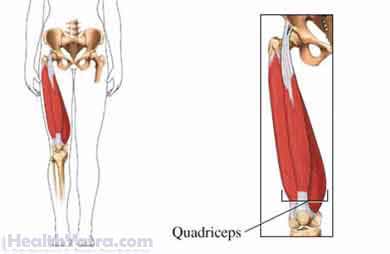Definition
Quadriceps strain is a partial tear of the small fibers of the muscles that make up the quadriceps group. The quadriceps are the large group of muscles in the front of the thigh. They consist of four muscles in each leg that run from the hips to the knees.
Causes
A quadriceps strain can be caused by:
- Stretching the quadriceps beyond the amount of tension or stress that they can withstand
- Suddenly putting stress on the quadriceps when the muscle is not ready for the stress
- Using the quadriceps too much on a certain day
- Experiencing a blow to the quadriceps
- Doing a strenuous quadriceps activity (such as dance)
Risk Factors
A risk factor is something that increases your chance of getting a disease, condition, or injury. Risk factors include:
- Sports that require bursts of speed, such as:
- Running
- Hurdles
- Long jump
- Basketball
- Soccer
- Football
- Rugby
- Fatigue
- Tight quadriceps
- Overexertion
- Cold weather
- Previous quadriceps injury
Symptoms
Symptoms include:
- Pain and tenderness in the front of the thigh
- Stiffness in the quadriceps
- Weakness of the quadriceps
- Bruising on the front of the thigh (if blood vessels are broken)
- Popping or snapping sensation as the muscle tears (rare)
Diagnosis
Your doctor will ask about your symptoms and medical history, your recent physical activity, and how the injury occurred. He or she will also examine your thighs for:
- Tenderness and/or bruising directly over the quadriceps
- Pain or weakness when contracting the quadriceps, particularly against resistance
Muscle strains are graded according to their severity:
Grade 1
- Some stretching with microtearing of muscle fibers
- Complete recovery can take 10-21 days
Grade 2
- Partial tearing of muscle fibers
- Recovery can take up to 1-2 months
Grade 3
- Complete tearing (rupture) of muscle fibers
- Recovery can take more than three months
- Surgery may be needed to repair the torn muscle fibers
For severe quadriceps strains, you may have an MRI or an ultrasound. These tests determine if the tearing requires surgical repair. Sometimes athletes need these tests to help predict the length of their recovery.
Treatment
Treatment depends on the severity of the strain.
Treatment usually includes:
- Rest—Do not do activities that cause pain, such as running, jumping, and weight lifting using the thigh muscles. If normal walking hurts, shorten your stride. Do not play sports until the pain is gone. Wait until your doctor has given you permission.
- Cold—Apply ice or a cold pack to the quadriceps area for 15-20 minutes 4 times a day for several days after the injury. Wrap the ice or cold pack in a towel. Do not apply the ice directly to your skin.
- Pain relief medications—Examples include aspirin, ibuprofen (Advil or Motrin), or acetaminophen (Tylenol). Topical pain medicines (such as creams and patches) applied to the skin are another option. Ask your doctor if you have any questions about using these medications. If you still have tenderness in the quadriceps while taking these drugs, do not return to physical activity. Check with your doctor before returning to play.
- Compression—Wear an elastic compression bandage (such as an Ace bandage) around your thigh to prevent additional swelling. Be careful not to wrap the bandage too tightly.
- Elevation—Keep your leg higher than your heart as much as possible for the first 24 hours to minimize swelling.
- Heat—Use heat only when you are returning to physical activity. Then use it before stretching or getting ready to play sports.
- Stretching—When the acute pain is gone, start gentle stretching exercises as recommended by a healthcare professional. Stay within pain limits. Hold each stretch for about 10 seconds and repeat six times.
- Strengthening—Begin strengthening exercises for your quadriceps as recommended by a healthcare professional.
If you are diagnosed with a strained quadriceps, follow your doctor’s instructions.
Prevention
To reduce the chance that you will strain your quadriceps:
- Keep your quadriceps muscles strong so they can absorb the energy of sudden physical stress.
- After a short warm-up period, stretch out your quadriceps.
- Learn the proper technique for exercise and sporting activities. This will decrease stress on all your muscles, including your quadriceps.

